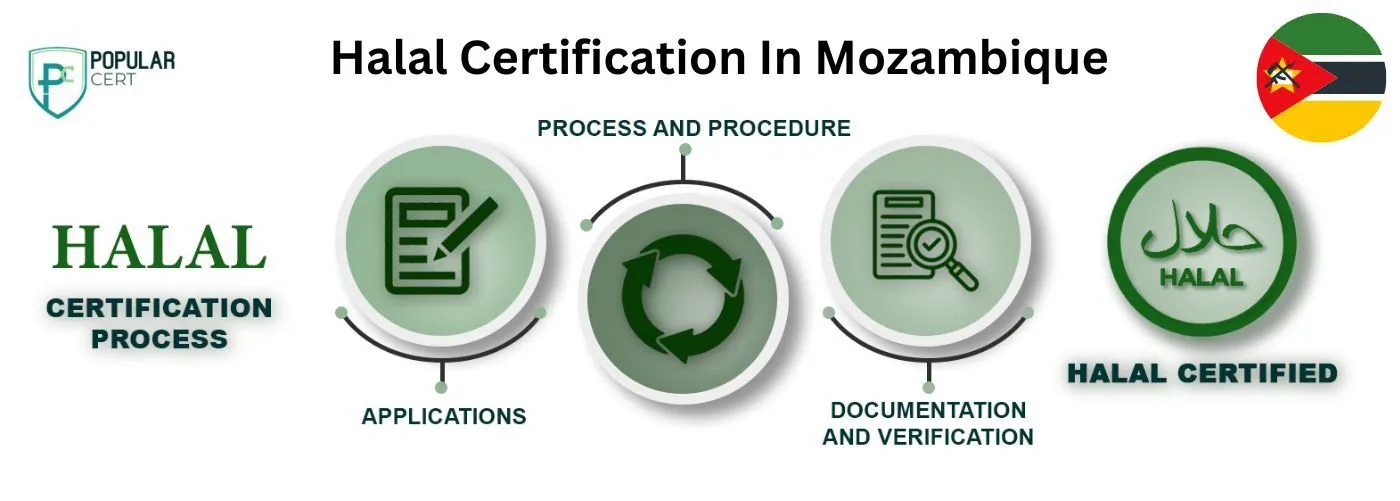HALAL certification in MOZAMBIQUE
Get Free Consultation
PopularCert helps businesses in Mozambique achieve Halal Certification, enabling them to meet strict quality and safety standards. With a growing economy and increasing demand for Halal products, Mozambique offers significant opportunities in the Halal market. Halal Certification in Mozambique is essential for businesses in the food, beverage, cosmetics, and pharmaceutical sectors to access both local and international markets.
Why Halal Certification is important for you and your business in Mozambique?
Halal certification is essential for businesses in Mozambique as it ensures compliance with Islamic dietary laws and meets the growing demand for Halal products. It helps companies build trust with customers, mitigate risks, and improve operational processes. Additionally, Halal certification enhances brand reputation and opens doors to local and international markets. Adopting Halal certification strengthens a company’s competitive edge in the global marketplace by demonstrating its commitment to quality, authenticity, and customer satisfaction, while fostering a strong connection with Muslim consumers.
Mozambique’s growing economy and expanding trade networks make it an ideal market for Halal products. The government ensures products meet strict quality and safety standards. Obtaining Halal Certification in Mozambique opens doors to a larger consumer base, helping businesses reach both local and international markets where Halal is a must. Whether in food, beverages, cosmetics, or pharmaceuticals, obtaining Halal Certification in Mozambique is essential for success in this expanding market.
How to Get Halal Certification in Mozambique?

Process to Get Halal Certification In Mozambique
Application Submission
Submit a detailed application to a recognized Halal certification body, including product details and manufacturing processes.
Document Review
The certification body reviews ingredients, sourcing, and processes to ensure compliance with Halal standards.
Facility Inspection
Conduct on-site audits to verify cleanliness, ingredient handling, and adherence to Halal practices.
Compliance Adjustments
Address any non-compliance issues identified during the inspection or document review.
Final Assessment
The certification body conducts a final evaluation of processes, documentation, and inspection reports.
Certificate Issuance
Upon successful completion, the business receives the Halal certificate, valid for a specific period.
Benefits of Halal Certification in Mozambique
- Market Expansion : Enables access to a broader consumer base, particularly in Muslim-majority regions.
- Consumer Trust : Builds confidence among customers by ensuring products meet Islamic dietary and ethical standards.
- Regulatory Compliance : Helps businesses meet local and international Halal requirements and standards.
- Brand Reputation : Enhances credibility and positions the business as a reliable provider of high-quality Halal products.
- Competitive Advantage :Differentiates products in a competitive market, attracting both Muslim and non-Muslim consumers who value quality and ethical practices.
Types Of ISO Certification In Mozambique
Get Free Consultation
Our Clients


















Cost of Halal Certification in Mozambique
The cost of Halal certification in Mozambique varies depending on factors such as the size of your business, the specific Halal certification requirements, and the complexity of your operations. The process involves assessing your current practices, making necessary adjustments, and ensuring compliance with Halal standards through audits by accredited certification bodies. While the initial cost may seem significant, Halal certification offers long-term benefits, including increased customer trust, access to local and international markets, and a stronger reputation for quality. The cost can also be influenced by whether you choose to work with external consultants or manage the process in-house
Why Choose PopularCert For Halal Certification in Mozambique?
PopularCert is a globally recognized consulting company specializing in Halal certification, advisory, and auditing services. We are the trusted choice for organizations seeking Halal certification in Mozambique due to our experienced, ethical consultants and proven success record. For Halal certification in Mozambique, choose PopularCert, a leader in consultancy, certification, and auditing services. Contact us, and our experts will promptly provide the best solution tailored to your needs.
GET A FREE CONSULTATION NOW
FAQ
What is Halal Certification?
Halal Certification ensures that products comply with Islamic dietary laws and guidelines. It applies to food, beverages, cosmetics, pharmaceuticals, and other consumable items, verifying they are prepared, processed, and handled according to Halal requirements.
Why is Halal Certification important in the Mozambique?
The Mozambique has a predominantly Muslim population and serves as a global hub for Halal products. Halal Certification boosts consumer trust, ensures compliance with local regulations, and opens doors to export opportunities in Muslim-majority countries.
Which industries need Halal Certification in the Mozambique?
- Food and beverage production
- Cosmetics and personal care products
- Pharmaceutical manufacturing
- Restaurants and catering services
- Slaughterhouses and meat processors
How to get Halal Certification in the Mozambique?
Follow these steps:
- Identify the applicable Halal standards for your product or service.
- Implement processes and sourcing practices that comply with Halal requirements.
- Conduct internal audits to ensure compliance.
- Apply to an accredited Halal Certification body for an audit and certification.
